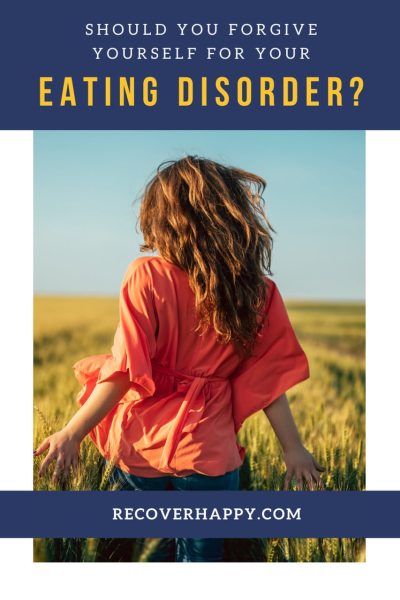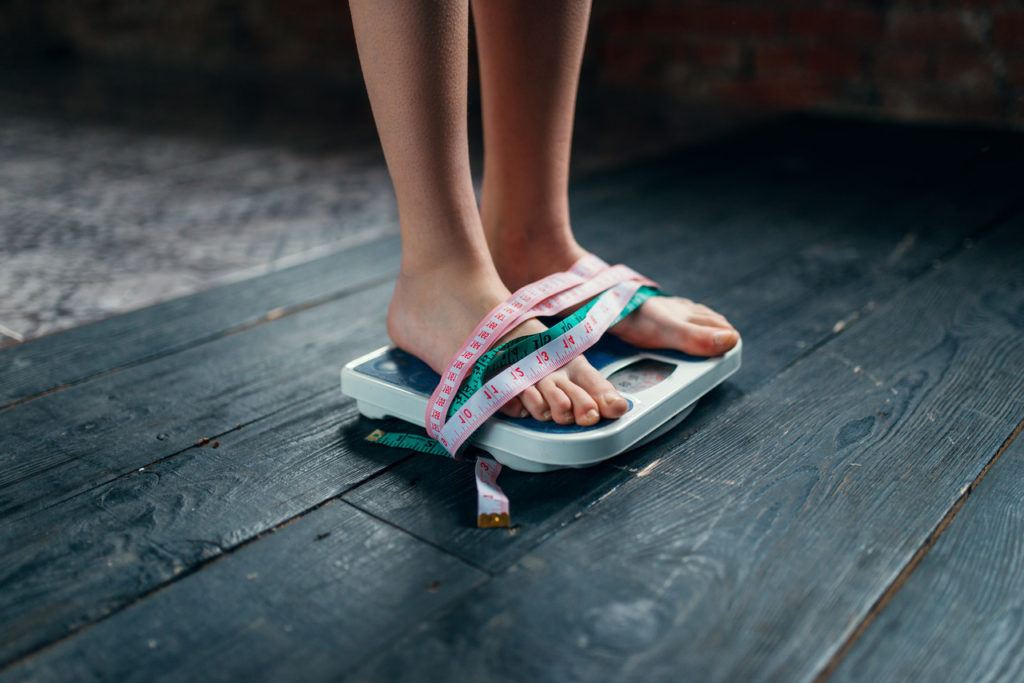Should you forgive yourself for your eating disorder?
By Tanja, Psychologist for Eating Disorders & Body Image


Hi there!
I’m Tanja. I’m a qualified psychologist specialising in eating disorders, negative body image and body hate. I’m also a survivor of anorexia.
My mission is to help you to end your lifelong struggles with food and your body and inspire you to uncover and embrace you true worth. Read more…
And then there are those situations where things don’t go the way we thought they would and we take it out on ourselves. We blame ourselves for not trying hard enough, not working enough, not making the right decisions, not being careful with our words. If you can relate to this, you are not alone.
I too have struggled with self-blame and self-judgement for a very long time. Even when I was already recovering from anorexia, I couldn’t let go of feelings of guilt, shame, anger and hatred. The guilt came from allowing my feelings o self-rejection and body hate to take over my life, which pushed me into anorexia at the age of 12. The shame resulted from allowing anorexia to destroy my entire youth and for worrying and hurting my relatives and friends. The anger and hatred were directed towards a person who made me aware of the diet culture and persuaded me to start my first diet, by telling me at the age of 12 that my legs and my bottom were too big and I should consider losing weight and be more careful with what I eat.
If you are not sure whether you are struggling with anorexia, read my blog article 10 silent signs you might have anorexia.
These negative feelings and thoughts of blaming, judging and hating were deeply rooted in me. It was impossible to let them go and to forgive myself and others. However, after a long mediation (which I did regularly) while recovering from my eating disorder, I finally realised that forgiveness was the one thing holding me back from fully healing from anorexia.
Join the Body Acceptance & Food Freedom Collective
Receive a weekly dose of inspirations to help you make peace with your body and food.
Don’t worry, we hate spam too. You can unsubscribe any time.
Categories
Anorexia
Binge Eating Disorder
Bulimia
Intuitive Eating
Mindfulness
Orthorexia
Strategies for Recovery
What is forgiveness?
From person to person, forgiveness can have different meanings. In general, it is a conscious decision to let go of feelings and thoughts of revenge and resentment towards people who you feel have harmed you, regardless of whether these people “deserve” your forgiveness or not. Forgiveness means that you acknowledge that what someone did was wrong and that the person’s actions no longer have any control over you and your life. But it doesn’t mean that you overlook or excuse the person’s actions or that you are doing the person a favour. The only one who benefits from forgiveness is you, as you free yourself from that person’s control over you, which will bring you peace in the long run.

Why forgiveness is important in eating disorder recovery
You may be wondering why forgiveness plays such a big role in eating disorder recovery and how it can help you break free from your eating disorder. Several studies have been done to investigate the effect of self-forgiveness on the outcome of an eating disorder. One study found that women with an eating disorder showed less self-forgiveness than women without an eating disorder.
The causes of eating disorders include a complex mixture of genetic, biological, social and environmental factors. This study suggests that there are further underlying causes that lead to and nourish eating disorder behaviours, thoughts and feelings.
These underlying causes include feelings of shame, guilt and self-blame and the belief that we don’t deserve to be loved, happy or accepted as we are. This and other clinical studies show the importance of dealing thoroughly with shame, guilt and self-blame, as self-forgiveness plays an important part in recovering from an eating disorder.
Forgiveness has also significant mental health benefits such as reducing self-criticism, self-destructive behaviours, anger and depression and increasing hope and confidence.

The benefits of self-forgiveness in eating disorder recovery
It is normal human behaviour to hide our guilt, pain, anger and resentment. Your eating disorder behaviours, thoughts and feelings are a response to this pain and anger. But if you acknowledge the feelings of failure and resentment towards yourself and others, confront them and overcome the anger, pain and guilt, you will free yourself from the power they have over you. Then the reasons for your eating disorder behaviours, thoughts and feelings will disappear and true healing from your eating disorder will be possible.
In summary, self-forgiveness during eating disorder recovery allows you to:
- Regain your happiness and find freedom from negative and unhealthy emotions and thoughts that prevent you from truly healing;
- Amplify your strengths over your weaknesses;
- Rediscover your true potential that was buried by your eating disorder;
- Improve your relationship with yourself and others by forgiving yourself;
- Look for healthy and positive forms of comfort;
- Improve your self-esteem and self-confidence by recognising the ability to forgive that lies within you;
Forgiveness is something that doesn’t happen immediately. You may have lived with your pain, guilt, anger and resentment for many years. Allow yourself the time you need to find the strength to forgive. Once you have forgiven yourself and others, you will be free of their control over you and you will be able to move forward in your eating disorder recovery journey.
“Forgiveness is no longer an option but necessary for healing”. Caroline Mys
You don’t need to struggle alone on your recovery journey.
Simply get in touch to discuss how I can help you.
It is entirely possible to overcome an eating disorder or body hate –
I have done it, others have done it and so can you!
Join the Body Acceptance & Food Freedom Collective
Receive a weekly dose of inspirations to help you make peace with your body and food.
Don’t worry, we hate spam too. You can unsubscribe any time.
You Might Also Enjoy...

Hi there!
I’m Tanja. I’m a qualified psychologist specialising in eating disorders, negative body image and body hate. I’m also a survivor of anorexia.
My mission is to help you to end your lifelong struggles with food and your body and inspire you to uncover and embrace you true worth. Read more…



